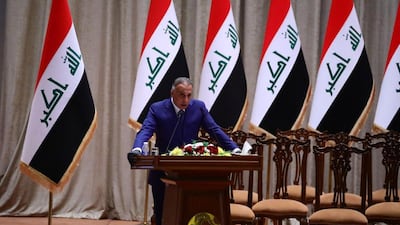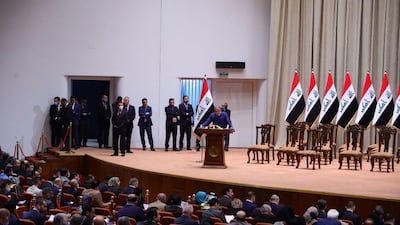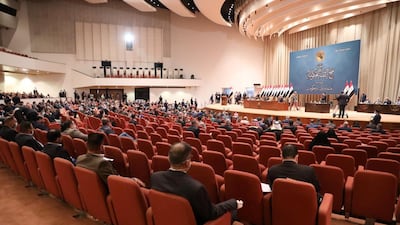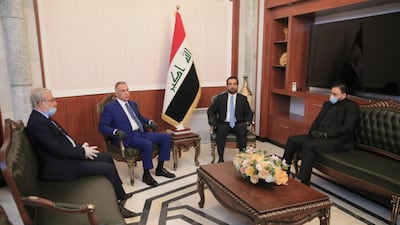Iraqi Prime Minister Mustafa Al Kadhimi must be ‘savvy’ when balancing pressures from protesters and the political class as he tackles Iraq's challenges, especially as anti-government demonstrations pick up momentum, experts say.
Mr Al Kadhimi, a former intelligence chief and human rights activist, has made a positive first impression in calling for an investigation into the killing of hundreds of protesters and the release of activists and demonstrators from prison.
But he has inherited an unenviable set of challenges that his predecessors failed to overcome, including a shattered economy, rampant corruption and worsening relations between the US and Iran.
Thousands of Iraqis took to the streets last October, protesting against corruption and unemployment in massive demonstrations that demanded an overhaul of the political system and the resignation of the ruling elite.
The protests, which were met with brutal crackdowns by security forces, led to the resignation of former prime minister Adel Abdul Mahdi, leaving the country in a political disarray for nearly six months as replacement candidates failed to secure the approval of parliament.
Recently the protest movement has revived.
Mr Al Kadhimi, who has no real political support, must juggle demands made by demonstrators and a powerful set of political parties.
"He's got to be very savvy in the room for manoeuvre but separate to those things he's also got to two powerful crises – financial crisis and Covid," Toby Dodge, head of the London School for Economics' Middle East Centre, told The National.
Mr Al Kadhimi is in a difficult spot but "he can use his public relations and something more substantive going forward to say to the demonstrators ‘look I’m trying and you’ve got to help me’,” Mr Dodge said.
Mr Al Kadhimi is trying his best to regain public trust and so far his actions and words have been decisive – if he continues then he will build some momentum, Sajad Jiyad, an independent Baghdad-based analyst, told The National.
“He will need to show what he's going to do to protect the most vulnerable in society as well as the issue of foreign policy and what happens with Iran and the US,” Mr Jiyad said.
Mr Al Kadhimi is “on the right track but public anger is going to occur regardless because there’s so many crises in the country.”
It comes down to how “he will deal with public anger and if he has the time to manage these problems and still maintain effective control of the government,” Mr Jiyad said.
What do the protesters want?
The prime minister has “a great deal of empathy with the demonstrators” as he comes from a “wider liberal activist section of Iraqi society that still very much exists and is influential in Baghdad,” Mr Dodge said.
Protesters are calling for a revolution against the Muhasasa (a system where senior positions in government are divided among the various ethno-sectarian groups) and the ruling political class, which they blame for the country’s woes.
“This is one thing he can’t give them; he is a strategic thinker but has very little room for manoeuvre,” Mr Dodge said.
Protesters have said they are not against a particular person, and even indicated a preference for Mr Al Kadhimi to take the premiership at one point. However, they also see who Mr Al Kadhimi “is accountable to for his job and that’s not the public, it’s the people who put him there,” Renad Mansour, senior research fellow and Iraq expert at Chatham House said.
In Iraq the people don’t choose those in power, the parties do, he said.
“Because of that, they are going to be apprehensive to anyone who the parties put in power because the role of that person is to re-distribute the bank of Iraq to the different political parties,” Mr Mansour said.
The October protests saw people of different social groups and faiths demonstrate side by side, portraying the depth of public anger towards the government, frustration with low living standards and widespread resentment towards Iranian interference in the country.
Can he succeed in winning over the public?
Mr Al Kahdimi faces strong opposition from Parliament meaning that he is unlikely to succeed in quelling public anger directed at deep structural issues, Lahib Higel, the senior Iraq analyst with Crisis Group said.
"He can lessen it and recover a certain degree of trust by pursuing accountability for those killed and deliver a timeline for early elections," Ms Higel told The National.
The prime minister will have to "impose certain austerity measures due to the severe fiscal deficit. This will inevitably hurt the population at large, and especially the poor, which can fuel more widespread protests again,” Ms Higel said.
In order to overcome that he must be transparent in his communications with the public and create a platform for dialogue with the protest movement on a reform agenda, she said.











